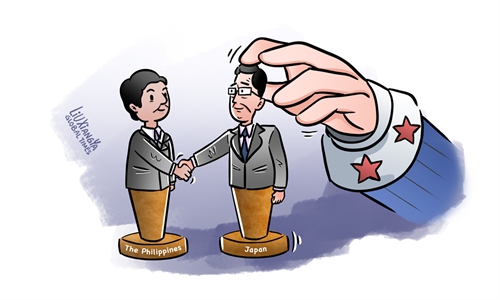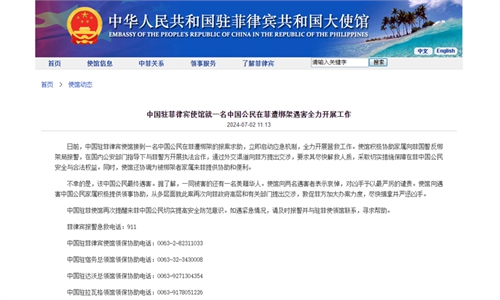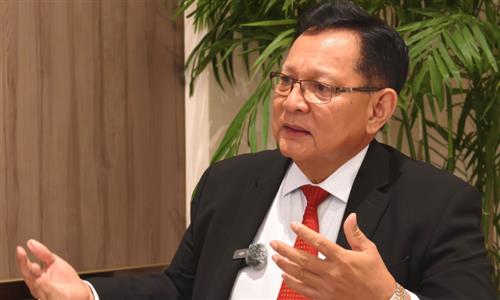
Scott Ritter Photo: Courtesy of Ritter
Editor's Note:
Recent tensions in the South China Sea, driven by Philippine provocation and US instigation, between China and the Philippines have raised concerns. Can the Philippines bear the consequences of being used as a pawn by the US? How does the US benefit from this? How to view the portrayal of China as a "bully" in Western media? Global Times (GT) reporter Ma Ruiqian recently interviewed Scott Ritter (Ritter), a former US Marine Corps intelligence officer, over these pressing issues.
GT: Some believe that the US is turning the Philippines into a "new colony" to maintain its interests in the Asia-Pacific region. How does the US benefit from this? Can the Philippines bear the consequences of being used as a pawn by Washington?
Ritter: No nation can emerge from a war intact. War is a very destructive process. Normally, a war will have a loser and a winner. But when you're a tool, you're a loser, no matter what. As a tool, your objectives, desires and needs aren't being considered by the person using the tool. The person using the tool is using it to further his or her objectives. In this case, the US is using the Philippines to further its domination of the Pacific and US neocolonial hegemony over the Pacific.
The Philippines was once a US colony and has been ruled as a neocolonial extension of America ever since they achieved their independence from the US. The Philippines is a nation that has important geopolitical gravitas; its location in the Pacific makes it ideal for a nation like the US seeking to extend its power into the Pacific.
The US can use the Philippines as a blocking mechanism to counter China's activities in the South China Sea. It can also use the Philippines as a base of operations to fall back on, to launch attacks against China, or to project US power. They seek to exploit Filipino manpower as a proxy force for the US, so that in any future conflict, it's Filipinos who are paying the price in terms of dead bodies, not the Americans. Eventually, like any tool, they will be broken. Regardless of whether the US achieves its objectives or not, the Philippines will be a broken nation, and that's not an ideal outcome.
GT: There are nine US military bases in the Philippines. How do you interpret the US' intentions in acquiring these bases? What does this mean for the Philippines?
Ritter: None of these bases are what I would call major military installations. In some ways, it would be better for the Philippines if the US had a major military base. Because that shows a major commitment to the Philippines. It says "we are here to stay." However, these nine bases can only be used by the US for small and medium-sized military operations, primarily to train the Philippine military. These small bases are something that the US establishes when it wants to come in, cause trouble, then leave. This is a disaster for the Philippines. This only sets them up for failure because the military power that the US will be projecting to the Philippines is not meaningful military power. It's not sustainable military power. It's only enough to get the Philippines in trouble. Then the US will leave, abandoning it as a broken tool at its disposal.
GT: If you had the opportunity to speak with the leaders of the Philippines, what advice would you give them on developing international relations and resolving the South China Sea issue?
Ritter: First of all, I would say that avoiding war should be the No.1 priority. The Philippines will never defeat China militarily, nor should they ever try to defeat China militarily. If China was a grossly irresponsible nation seeking to project its military power in the region to become a regional hegemony, I would say the Philippines would be correct in seeking US assistance. But China is not seeking to do that. China's buildups in the South China Sea are not because of the Philippines. It's designed to be a bulwark against US expansion. The Philippines should not interpret what China is doing in the wrong way.
China is a major regional power, and the Philippines needs to accept this reality. China exists, and it's up to the Philippines to sit down with the Chinese and have an honest discussion about the best way forward for both nations. The history of China shows it will listen and respond. The way to resolve this isn't by turning to the US and saying, "Come in and let's pick a fight with China." This would be my advice to the Philippines: If you have a problem with China, and I think you do, you need to talk with China. Diplomacy is the answer. China is not threatening you with military force and will seek to resolve the situation to the mutual benefit of both parties.
GT: How do you view the portrayal of China as a "bully" to smaller countries in Western media? How should China deal with such "China threat" narrative?
Ritter: What you're hearing is completely aligned with what the US does right now. When the US calls China a "regional bully," it's because the US is a regional bully. So, in order to defend its policies, the US has to project what it is onto China. This makes China look worse than the US is, and that works when people don't understand the reality of China.
We have oversimplified China, turning it into a cartoon character of a "bad nation," an "evil nation." We continue to build upon the prejudices that exist in the US about communism. If we're going to talk about China, we need to understand that we need to study it. But we don't want to do that, because once we study and understand a nation, it becomes difficult to engage in propaganda against it and to shape the minds of Americans against China. We need Americans to be ignorant about China.
I think China needs to allow more Americans to come to China, to expose them to the reality of the country. This should be done not by telling Americans what China is, but by letting them discover China for themselves and learn about it. This is a form of information warfare, but one that I don't think China needs to fear. I think China is very proud of what it has become, the nation it is, and the contributions it has made to the world.
Once we see the truth about China, we will be in a better position to evaluate the misinformation being spread by our government and then pressure our government to learn to live in peace and harmony with China. If we view the Chinese as normal, rational people, and show respect for their culture and history, there will be no need for confrontation. Instead, the focus will be on peaceful cooperation and coexistence rather than confrontation.



